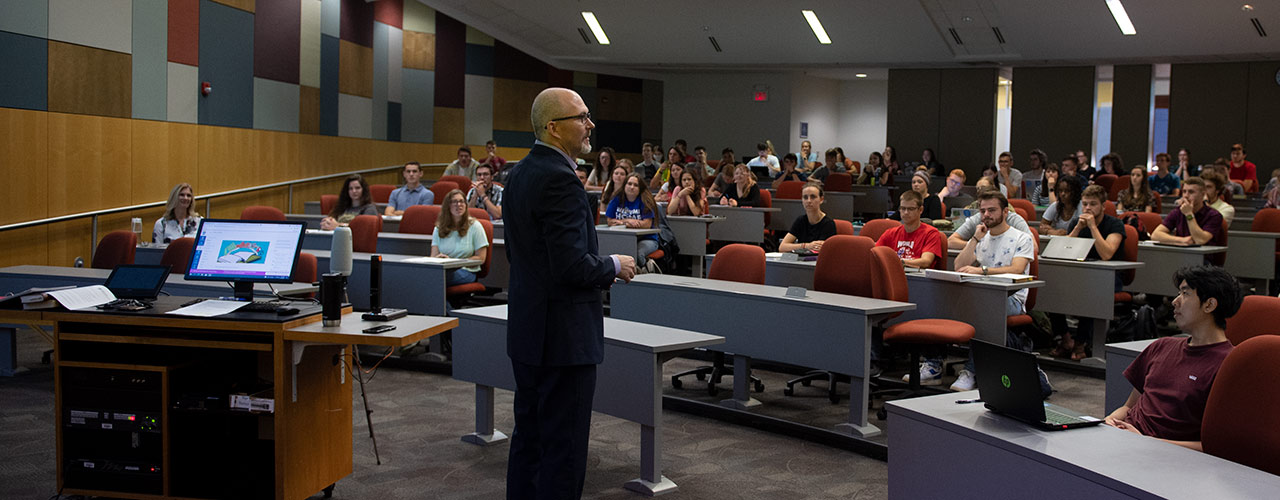by Clem Boyd, Communication Content Manager
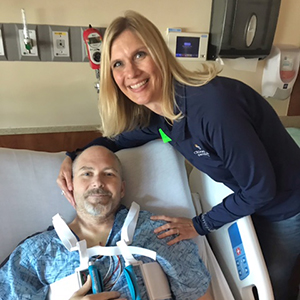 The fact that Dr. Michael McKay, assistant professor of biblical theology, is teaching at Cedarville this fall is a miracle. By his own account, he shouldn’t even be here.
The fact that Dr. Michael McKay, assistant professor of biblical theology, is teaching at Cedarville this fall is a miracle. By his own account, he shouldn’t even be here.
Two months to the day before the start of classes, Michael got out of bed and noticed he wasn’t feeling right. He wrote it off as a bad case of morning aches and pains. Just walk it off, he told himself. Or get some breakfast. “You need to eat,” he reasoned.
But when his left leg went completely numb, he knew something seriously wrong was going on.
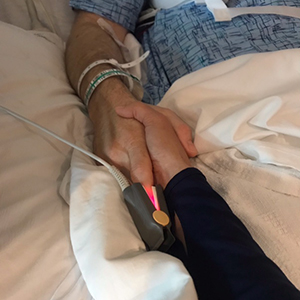
On June 19, 2021, Michael suffered an aortic dissection, which is just as bad as it sounds. The inner wall of the aorta, the human body’s north-south superhighway for the bloodstream, had been breached and a crack in the outer wall had formed.
According to the International Registry of Acute Aortic Dissection, 33% of patients do not survive the first 24 hours, and half do not make it past 48 hours.
It was a Saturday morning at 11 a.m. when Michael noticed the initial symptom of a unique pain in his throat and his back.
McKay was in good shape, working out on his rowing machine and lifting weights three to four times a week. He had a knee replacement in 2020, which had emboldened him to exercise more consistently and vigorously. He felt great, the best of his married life.
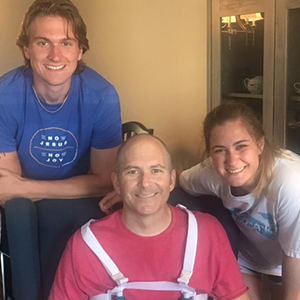 “Once I got my knee replaced, a whole new world opened up to me,” he said. “I had been trying to exercise regularly. Now, we’ll have to shift things.”
“Once I got my knee replaced, a whole new world opened up to me,” he said. “I had been trying to exercise regularly. Now, we’ll have to shift things.”
After his left leg went numb, the alarm bells sounded for his wife, Lee-Ann, and him. Stroke was the first thought, and even the emergency room doctors at Greene Memorial Hospital in Xenia thought the same. But after McKay’s second CT scan of his chest, it was clear that a more concerning health crisis was underway.
“With the stroke, they were kind of optimistic,” Michael shared. “When they saw the second scan, the positivity dropped. They realized this was a dissected aorta, and people usually don’t make it to the hospital.”
Michael was sped off to Kettering Medical Center and scheduled for emergency surgery that afternoon.
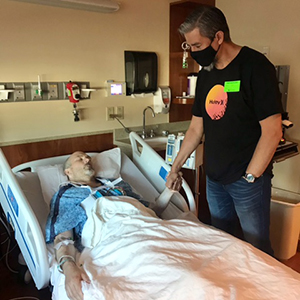 “I wasn’t thinking I was going to die to be honest, but it seemed like I was in a bad state,” he recalled while still at Greene Memorial.
“I wasn’t thinking I was going to die to be honest, but it seemed like I was in a bad state,” he recalled while still at Greene Memorial.
"It wasn’t till I got to Kettering that the doctor told me the chances of survival are low. That’s when I thought intellectually, ‘I’ll be with the Lord today.’ Emotionally, I didn’t have time to process that.”
For the next 10 ½ hours, his cardiothoracic surgeon, Dr. Peter Pavlina, and the operating room team worked diligently to save Michael. They started with his left leg where the main artery had collapsed, which was the cause of his numbness. He would have lost his leg without this prompt attention.
Pavlina and his team created a bypass to restart blood flow to the left leg, then repaired the aortic aneurysm at the juncture with the heart. An aneurysm is a ballooning of the blood vessel wall, and doctors believe this was the source of the dissection.
Last, of all, the surgical team turned their attention to an aortic valve, which had collapsed inside the heart and would have to be replaced or repaired.
“They asked me before the surgery if I wanted a pig valve or an artificial valve,” Michael said. “But they used existing body parts to reconstruct the valve.”
Throughout the long hours, Lee-Ann was comforted by friends from Patterson Park Church in Beavercreek where the McKays attend. Their children – Alexis, Andrew, and Katherynn – were all out of town, but by the end of the surgery Alexis was by her side, with Andrew joined not long after. Katherynn was in Egypt. Lee-Ann and she spoke during the surgery.
She was also visited by a paramedic who shared Michael’s words as he was wheeled into surgery, “Tell my wife I love her,” and by the anesthesiologist who wanted to share with Lee-Ann what Michael had said in the operating room before he fell asleep – “She’ll be the beautiful one in the waiting room talking to everyone.”
“It was so gracious of the Lord to do that,” Lee-Ann said.
Much to the shock of medical personnel, Michael was able to get out of bed and walk the next day. He continues monitored rehabilitation at Greene Memorial with low weights and walking on a treadmill.
Throughout this traumatic and life-changing ordeal, the McKays have been bolstered by the support of their immediate family and by their church family around the world. They heard about people praying for Michael in south Asia, in Papua New Guinea, and Italy.
“It’s so humbling and so encouraging to our hearts,” Lee-Ann said. “We would weep sometimes, the beauty of the body of Christ.”
As he returned to the classroom on August 19, Michael was reflective. “I’m in the bonus round,” he shared. “By all the statistics, I should be dead. This is why the doctors said it’s a miracle. Every medical professional in my family or who is a friend of mine, when they heard what happened before they heard about the success of the surgery, many of them told me they did not think they would have seen me again until the presence of the Lord.”
Michael realizes that he now has physical limits. He keeps tabs on his blood pressure (BP) regularly to make sure it stays at or below 130. During a recent class, he checked his BP before and after to see if it was elevated. There are certain tasks he would have engaged without hesitation, like picking up a 45-pound bag of water softener salt, that now requires him to ask Lee-Ann or the kids for help.
“I’ll never be able to do intense exercise in the future,” he said. “As I get better, I will be able to hike and walk. But now I have to manage my heart rate and blood pressure.”
When his mind begins to drift toward what has been lost, God reminds him of what he still has. “When I get negative or despair, the Lord is quick to confront me and remind me of all I can do,” Michael said. “I did not lose my leg, and I’m still alive. I’m grateful for him reminding me of all that I do have, and it gives me a sense of optimism and hope for what the Lord has for me to do, and that he’s equipped me to do, and I have an opportunity to praise him for that.”
For Lee-Ann, she noted that it’s natural to grieve what has been. “It’s just a natural process,” she said. “He was in great shape before, and he’s struggling now. It’s hard for him to walk around the block two times. He will be on medicines for the rest of his life.
“But my comfort is in the fact that God is unchanging,” she added. “That’s what got me through. He is always good, he is always faithful and he is loving, regardless of the outcome of all this. That was a comfort to me, and it’s gotten me through everything — all the moments of crying or when I was overwhelmed with fear. I learned to focus on Jesus and to stay grounded in who Jesus was regardless how crazy things were.”
Michael is teaching two in-person classes and two online courses this fall. But one suspects this semester’s Bible classes will have a greater weight and depth because of the profound experiences of the teacher.
“This is Christianity 101 in many ways,” Michael said. “When we believe in the Gospel, we believe our sins are forgiven because of Jesus’ death, and we’ll be with him because of his resurrection. Over the last two months, I’ve been meditating on that more and more. It’s very comforting to know that Jesus has gone before me into death; he’s walked that trail, and he’s leading the way.”
Located in southwest Ohio, Cedarville University is an accredited, Christ-centered, Baptist institution with an enrollment of 4,550 undergraduate, graduate, and online students in more than 150 areas of study. Founded in 1887, Cedarville is one of the largest private universities in Ohio, recognized nationally for its authentic Christian community, rigorous academic programs, including the Master of Divinity program, strong graduation, and retention rates, accredited professional and health science offerings, and high student engagement ranking. For more information about the University, visit cedarville.edu.
















